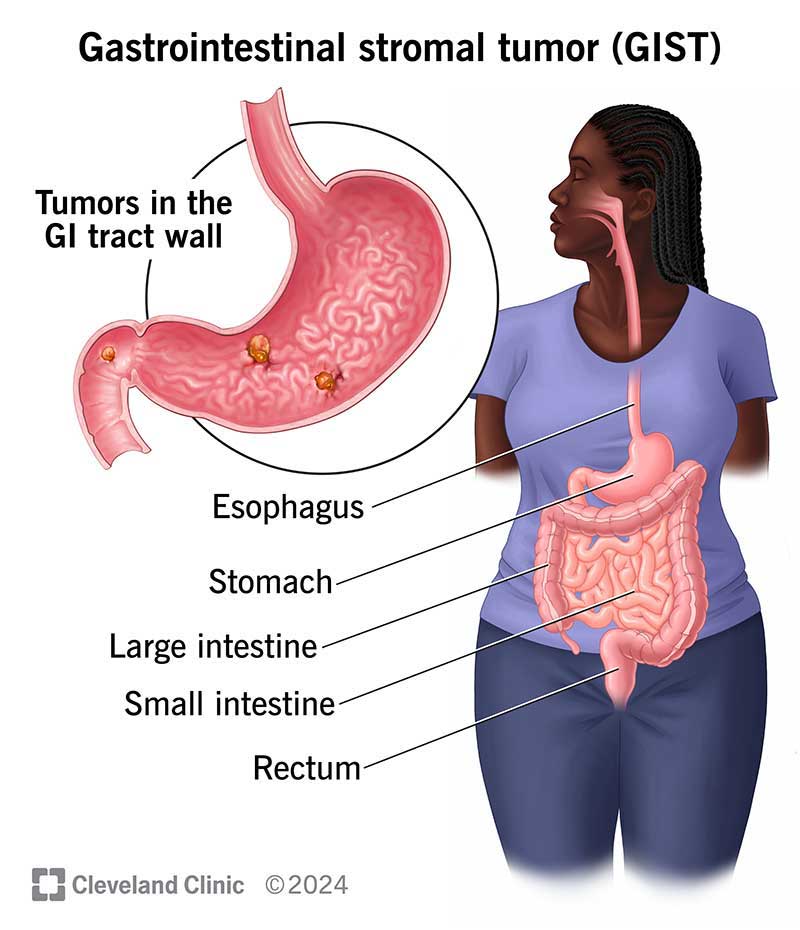Gastrointestinal stromal tumors (GISTs) are rare cancerous tumors in your digestive system. They may not cause symptoms. But when they do, symptoms may include belly pain, blood in your poop and vomiting blood. Surgery to remove a GIST is the most common treatment. In some cases, surgery cures the condition. But these tumors can come back.
Advertisement
Cleveland Clinic is a non-profit academic medical center. Advertising on our site helps support our mission. We do not endorse non-Cleveland Clinic products or services. Policy

Image content: This image is available to view online.
View image online (https://my.clevelandclinic.org/-/scassets/Images/org/health/articles/gastrointestinal-stromal-tumor)
GISTs are rare cancerous tumors. They’re a type of soft tissue sarcoma. The tumors develop in certain cells known as the interstitial cells of Cajal, which are in the wall of organs in your gastrointestinal tract. The tumors typically form in your stomach or small intestine in your gastrointestinal tract.
Advertisement
Cleveland Clinic is a non-profit academic medical center. Advertising on our site helps support our mission. We do not endorse non-Cleveland Clinic products or services. Policy
Some gastrointestinal stromal tumors are small, about the size of a pencil eraser. Smaller tumors may not cause symptoms. Some GISTs can grow large enough to cause symptoms like abdominal pain, fatigue and nausea. Healthcare providers treat GISTs with surgery to remove the tumors.
This condition may not cause symptoms. Often, people learn they have a GIST when they have a test or surgery for another reason. When symptoms develop, they may include:
This condition usually happens when the KIT gene changes. The change causes cells to produce a protein (KIT CD117). This protein causes cells in your gastrointestinal tract to multiply and form tumors. The genetic change may happen during your lifetime. But you may develop GIST if you inherit a tumor disorder that increases your risk, including:
Advertisement
A healthcare provider will ask you about your symptoms and how long you’ve had them. They’ll do a physical exam. They may also do tests, including:
Treatment may be a combination of surgery and targeted therapy. Surgery may be the only treatment you need if you have small tumors. But you may have targeted therapy before surgery to shrink a large tumor.
Treatment can ease your symptoms and sometimes cure a gastrointestinal stromal tumor. But a GIST may come back. You may have follow-up appointments every three to six months so your oncologist can look for signs of a new GIST. They may do tests, including:
Overall, 85% of people with GIST are alive five years after diagnosis. Other survival rates are:
| Tumor location | Five-year survival rate |
|---|---|
| Local — the tumor didn’t spread from where it started | 95% |
| Regional — the tumor spread to nearby tissues and organs | 84% |
| Distant — the tumor is in more distant areas of your body | 52% |
| Tumor location | |
| Local — the tumor didn’t spread from where it started | |
| Five-year survival rate | |
| 95% | |
| Regional — the tumor spread to nearby tissues and organs | |
| Five-year survival rate | |
| 84% | |
| Distant — the tumor is in more distant areas of your body | |
| Five-year survival rate | |
| 52% |
Cancer survival rate data can be confusing. You may feel anxious about your situation. It’s important to remember that a survival rate is an estimate, not a prediction. Ask your oncologist to explain what you can expect.
Gastrointestinal stromal tumors (GISTs) may not cause symptoms. If they do, you might assume that you have the stomach flu or an upset belly from something you ate. It may come as a shock to learn that a rare cancerous tumor is why you don’t feel well. Treatment can often ease your symptoms and cure GIST. If you have this type of tumor, take some time to learn about this rare disease. You’ll have questions, and your healthcare team will be there with answers, support and more.
Advertisement

Sign up for our Health Essentials emails for expert guidance on nutrition, fitness, sleep, skin care and more.
Learn more about the Health Library and our editorial process.
Cleveland Clinic’s health articles are based on evidence-backed information and review by medical professionals to ensure accuracy, reliability and up-to-date clinical standards.
Cleveland Clinic’s health articles are based on evidence-backed information and review by medical professionals to ensure accuracy, reliability and up-to-date clinical standards.
When you’re diagnosed with a rare gastrointestinal stromal tumor, Cleveland Clinic offers the personalized treatment options to match your needs.
